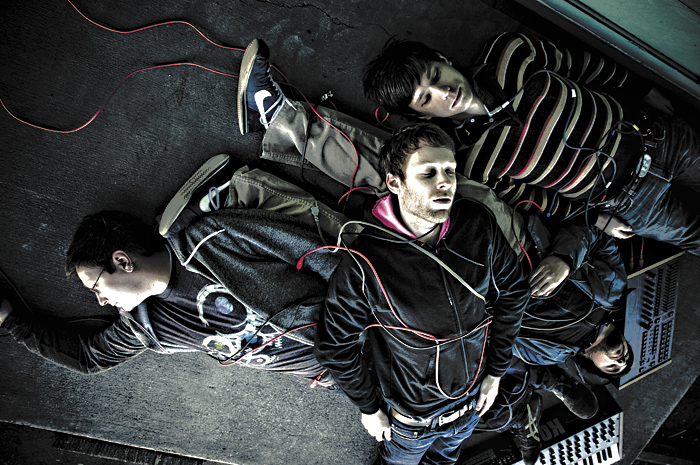While anticipation for the Crocodile’s re-opening (currently projected for late February) builds, it’s becoming more evident to me all the time that they’ll have a great deal of work to do if they want to regain the space’s previous status as the heart of Seattle’s music community. I wish them all the success in the world, and I can’t wait to see what the new space looks like, but it’s obvious to me that the Sunset has taken on their hallowed mantle rather seamlessly over the past year. Whether it’s the fact that now you can really feel (and occasionally smell) the history when you walk in the door of that Ballard club, or the familial comfort that comes from an almost complete absence of staff turnover, the Sunset has filled the void left when the Croc was unceremoniously shuttered at the end of 2007.
That community-cultivated energy was clearly at play last Thursday during the second in a series of benefits in the name of the late, great musician John Spalding (the first took place the night before at the Comet, and many more are planned for the rest of January; complete schedule details can be found at www.myspace.com/lovelandrock). Everyone I encountered was emanating that telltale mixture of celebration and sadness that distinguishes benefit shows held in honor of someone who has already passed away (proceeds were being earmarked for Spalding’s widow). Spalding’s posthumous publicist Chris Estey was on hand to sporadically MC, brimming over with his trademark smile and making sure everyone knew there were posters for sale in the back of the club.
I was somewhat surprised not to see the place entirely sold out, but it was pleasantly full during Born Anchors’ set. Though that band’s stage banter remains strangely off-putting (this was the second time I’ve seen them play a benefit show where the frontman seemed to be enjoying tossing haphazard insults at the audience), their live performance has dramatically improved over the past few months. Manners they may lack, but in the department of epic, earnestly impassioned rock, Born Anchors could take on Boy-era U2 in a barroom brawl with a good chance of victory. Headliners Helms Alee, however, remained practically peerless in their pursuit of the almighty power chord. So captivating are they live that I typically lose all track of time and simply find myself wishing they’d never stop playing.
Similar hypnotic techniques are at the disposal of local band Sleepy Eyes of Death, who will celebrate the release of their new Dark Signals EP this Saturday, January 17 at Neumo’s. Watching the four-piece (five, if you include “Industrial Light and Magic” charge and erstwhile Scarecrow Video employee Brandon Lanich) methodically build layers of chilly synth and celestial samples over thick drums (both organic and manmade) while impaling themselves occasionally on shards of Gibson and Fender guitars is essentially like watching a team of scientists build a futuristic Frankenstein before your eyes. Should Seattle music fans ever find themselves lamenting the lack of Mogwai or My Bloody Valentine–flavored bands in the landscape, they clearly haven’t been to a Sleepy Eyes of Death show.
“We had all been in traditional rock bands prior, and I think we were all ready for something different right around the same time,” explains Moog master Keith Negley. “We didn’t know of too many bands playing rock music with synthesizers in Seattle, and I think we all like being left-of-center in terms of the scene.”
Part of being left-of-center means assigning great worth to the atmospherics created by the band’s elaborate lighting rig and fog machine, effects which could seem gimmicky if they weren’t so obviously intrinsic to the live experience for the band as much as for the audience.
“I think the lights and fog came about initially because we wanted to push the live experience as far as we could,” Negley continues. “We all had an appreciation for how visuals can enhance what you’re hearing, but now that we own our own light rig and have gotten in the habit of rehearsing with them, it really does seem to enhance our playing. It focuses us; all the trivial details fall to the wayside when the room goes black and the strobes come on. I think if every band tried it, they’d never play without them again.”








